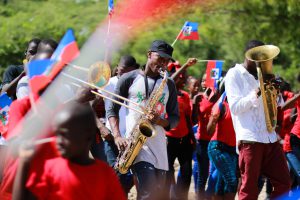
A new class about Haitian Creole and culture will be available at UCF this fall.
Sak pase! The UCF Modern Languages and Literatures Department is excited to announce two new classes for the 2019-20 school year: Haitian Creole and Culture I (HAI 1100C) and Haitian Creole and Culture II (HAI 1101C). In this series of classes, students will be introduced to Haitian culture as well learn how to speak, read, listen and write Creole. HAI 1100C is open for fall enrollment on myUCF, while HAI 1101C is open for spring enrollment. Taking both classes can satisfy UCF’s foreign language requirements.
“It is both necessary and strategic for UCF, the largest university in the United States, to offer Haitian Creole courses,” says Nick-Myrca Gauthier, who will teach the classes. “UCF has always been very committed to our community, so responding to this need of teaching Haitian Creole at the university level has received the utmost attention.”
So, why should you enroll in Haitian Creole and Culture this fall?
1. Haitian Creole is the third most spoken language in Florida.
In 2000, Florida had 182,224 foreign-born Haitians—43.5 percent of the total foreign-born Haitian population in the United States—and that number is growing. “The proximity of the island of Haiti to Florida coupled with the devastating earthquake of 2010 caused many Haitians to relocate to Florida,” says Gauthier.
2. Haitian Creole is phonetic and does not have an overwhelming number of rules.
A phonetic language is one that has a direct correspondence between symbols and sounds. Also, one big plus for English speakers learning Haitian Creole is that there are no conjugations like in Spanish.
3. In addition to learning the language, you will learn about and experience Haitian culture.
This includes their delicious food, beautiful music and exciting dance styles.
4. Acquiring proficiency in Haitian Creole is necessary to anyone who wishes to collaborate with the Haitian community and help facilitate or implement outreach programs.
“Although both French and Creole are spoken in Haiti, the predominant language of the island is Creole because it is the only language that is spoken by all,” says Gauthier. “Therefore, Haitian Creole is the language that anyone looking to connect with the community should learn.”
This is an especially good language for UCF medical, pre-med and anthropology students to learn, since their programs frequently offer outreach activities in Haitian villages. “Learning the language will enhance the experience for both the students and the community members they will be working with,” says Gauthier.
5. With the increasing need for bilingual professionals, learning Haitian Creole will prepare students to become competitors in the workplace both locally and abroad.
“Today, employers’ demand for Haitian Creole is high in all sectors of our community, from education and translation to STEM and government,” says Gauthier.
Talk with your advisor about how HAI 1100C and HAI 1101C can fit into your education plan!